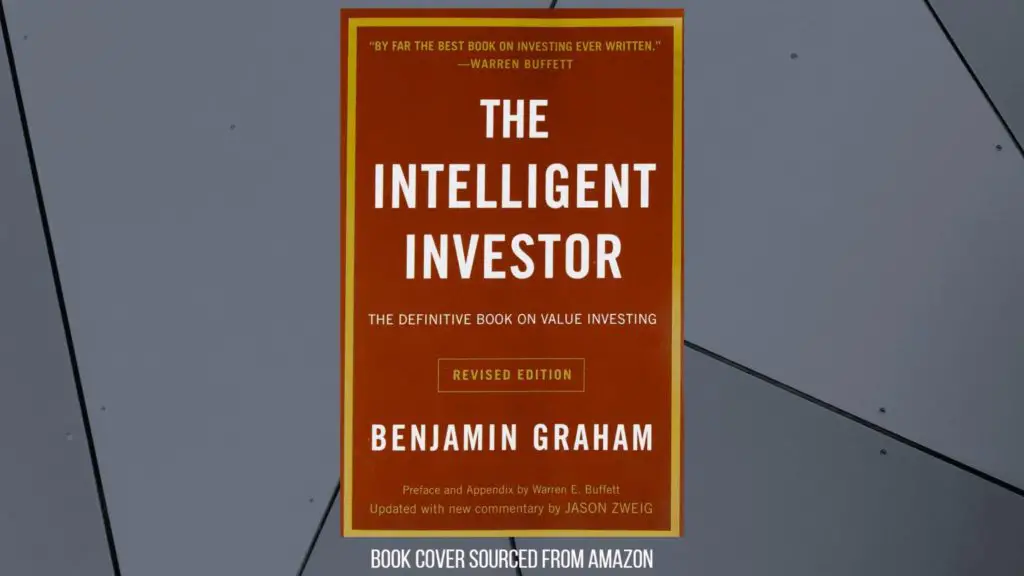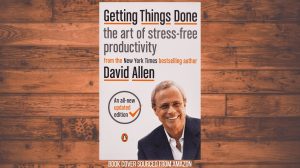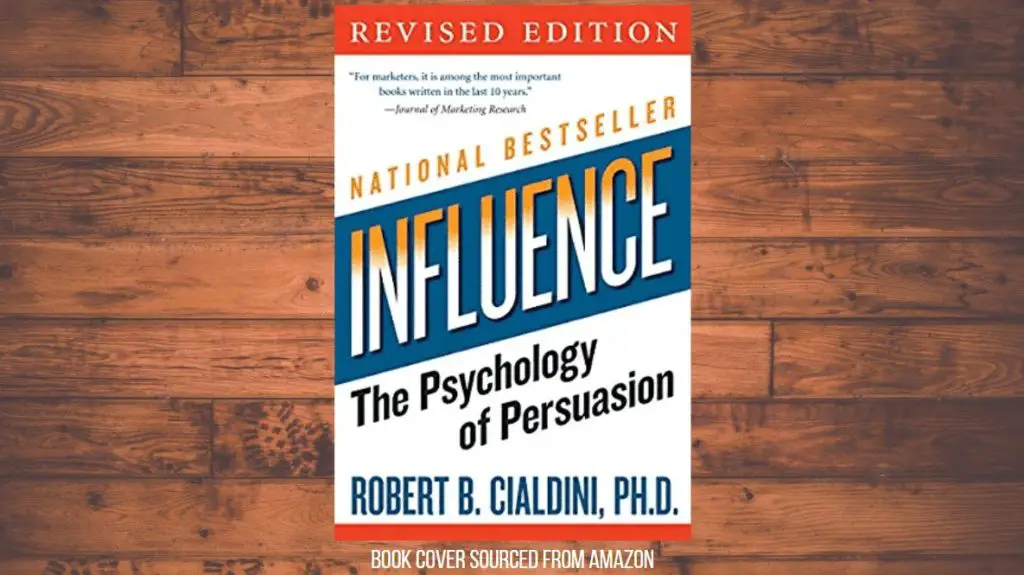This post may contain affiliate links, which means I’ll receive a commission if you purchase through my links, at no extra cost to you. Please read full disclosure for more information.
HIGH-LEVEL SUMMARY
The Intelligent Investor is a timeless book written by one of the greatest minds in investing: Benjamin Graham. The book has gone through several iterative updates and this latest version comes with commentary on each chapter from Jason Zweig.
This book aims to guide the reader in the adoption and execution of effective investment policy. The Intelligent Investor will teach you three important lessons:
- How you can minimize the odds of suffering irreversible losses
- How you can maximize the chances of achieving sustainable gains; and
- How you can control the self-defeating behavior that keeps most investors from reaching their full potential.
Link To Book
The Intelligent Investor can be found on Amazon at this link here if you are interested in reading.
Related Reading
- Mutual Funds vs Index Funds
- What is Dollar-Cost Averaging?
- Book Review: The Psychology of Money by Morgan Housel
- Book Review: The Path by Peter Mallouk and Tony Robbins
- Importance of Saving Early in Your Career
TOP 35 TAKEAWAYS
In no particular order
1. To invest successfully over a lifetime does not require a stratospheric IQ, unusual business insights, or inside information. What’s needed is a sound intellectual framework for making decisions and the ability to keep emotions from corroding that framework.
2. The sillier the market’s behavior, the greater the opportunity for the business-like investor.
3. The market is a pendulum that forever swings between unsustainable optimism (which makes stocks too expensive) and unjustified pessimism (which makes them too cheap). The intelligent investor is a realist who sells to optimists and buys from pessimists.
4. The future value of every investment is a function of its present price. The higher the price you pay, the lower your return will be. The intelligent investor realizes that stocks become more risky, not less, as their prices rise—and less risky, not more, as their prices fall. The intelligent investor dreads a bull market, since it makes stocks more costly to buy.
5. No matter how careful you are, the one risk no investor can ever eliminate is the risk of being wrong. Only by insisting on what Graham called the “margin of safety”—never overpaying, no matter how exciting an investment seems to be—can you minimize your odds of error.
6. No statement is more true and better applicable to Wall Street than the famous warning of Santayana: “Those who do not remember the past are condemned to repeat it.”
7. The defensive (or passive) investor will place his chief emphasis on the avoidance of serious mistakes or losses. The determining trait of the enterprising (or active, or aggressive) investor is his willingness to devote time and care to the selection of securities that are both sound and more attractive than the average.
8. The investor’s chief problem—and even his worst enemy—is likely to be himself. Your very refusal to be active, your renunciation of any pretended ability to predict the future, can become your most powerful weapons.
9. While enthusiasm may be necessary for great accomplishments elsewhere, on Wall Street it almost invariably leads to disaster.
10. An investor calculates what a stock is worth, based on the value of its businesses. A speculator gambles that a stock will go up in price because somebody else will pay even more for it.
11. Inflation: Holders of stocks have the possibility that a loss of the dollar’s purchasing power may be offset by advances in their dividends and the prices of their shares.
12. You can bolster your defenses against inflation by branching out beyond stocks. You can invest into REIT (Real Estate Investment Trusts) index funds and TIPS (Treasury Inflation-Protected Securities).
13. The intelligent investor must never forecast the future exclusively by extrapolating the past. The only thing you can be confident of while forecasting future stock returns is that you will probably turn out to be wrong.
14. The stock market’s performance depends on three factors: real growth (the rise of companies’ earnings and dividends) inflationary growth (the general rise of prices throughout the economy) speculative growth—or decline (any increase or decrease in the investing public’s appetite for stocks)
15. There are two ways to be an intelligent investor: by continually researching, selecting, and monitoring a dynamic mix of stocks, bonds, or mutual funds; or by creating a permanent portfolio that runs on autopilot and requires no further effort (but generates very little excitement).
16. The defensive investor and common stocks – 4 rules: 1) There should be adequate though not excessive diversification. 2) Each company selected should be large, prominent, and conservatively financed. 3) Each company should have a long record of continuous dividend payments. 4) The investor should impose some limit on the price he will pay for an issue in relation to its average earnings over, say, the past seven years. (e.g. not paying for a stock more than 20x P/E ratio).
17. By putting your portfolio on permanent autopilot, you prevent yourself from either flinging money at the market just when it is seems most alluring (and is actually most dangerous) or refusing to buy more after a market crash has made investments truly cheaper (but seemingly more “risky”).
18. The costs of day trading wear away your returns. Aside from the high probability that most of your trades will be losses, you will rack up commission costs and your gains will be taxed as ordinary income rather than long-term capital gains.
19. Investing in IPOs isn’t smart. Most of the high returns on IPOs are captured by members of an exclusive private club—the big investment banks and fund houses that get shares at the initial (or “underwriting”) price, before the stock begins public trading. If, like nearly every investor, you can get access to IPOs only after their shares have rocketed above the exclusive initial price, your results will be terrible.
20. A study by two finance professors at Duke University found that if you had followed the recommendations of the best 10% of all market-timing newsletters, you would have earned a 12.6% annualized return from 1991 through 1995. But if you had ignored them and kept your money in a stock index fund, you would have earned 16.4%.
21. Growth stocks are worth buying when their prices are reasonable, but when their price/earnings ratios go much above 25 or 30 the odds get ugly. The intelligent investor, however, gets interested in big growth stocks not when they are at their most popular—but when something goes wrong.
22. Foreign investment. If you live in the United States, work in the United States, and get paid in U.S. dollars, you are already making a multilayered bet on the U.S. economy. To be prudent, you should put some of your investment portfolio elsewhere
23. Most of the time, the market is mostly accurate in pricing most stocks. But sometimes, the price is not right; occasionally, it is very wrong indeed.
24. One of Graham’s most powerful insights is this: “The investor who permits himself to be stampeded or unduly worried by unjustified market declines in his holdings is perversely transforming his basic advantage into a basic disadvantage.” He means that the intelligent individual investor has the full freedom to choose whether or not to follow Mr. Market.
25. Investing intelligently is about controlling the controllable: your brokerage costs, how often you trade, expense ratios, how you diversify, tax efficiency, etc.
26. The brilliant psychologists Daniel Kahneman and Amos Tversky have shown that the pain of financial loss is more than twice as intense as the pleasure of an equivalent gain. Making $1,000 on a stock feels great—but a $1,000 loss wields an emotional wallop more than twice as powerful.
27. Most mutual funds underperform the market, overcharge their investors, create tax headaches, and suffer erratic swings in performance.
28. First of all, recognize that an index fund—which owns all the stocks in the market, all the time—will beat most funds over the long run. Its rock-bottom overhead—operating expenses of 0.2% annually, and yearly trading costs of just 0.1%—give the index fund an insurmountable advantage.
29. Hold an index fund for 20 years or more, adding new money every month (i.e. dollar-cost averaging), and you are all but certain to outperforms the vast majority of professional and individual investors alike. Late in his life, Graham praised index funds as the best choice for individual investors, as does Warren Buffett.
30. Investors who are prepared to pay a fee for the management of their funds may wisely select some well-established and well-recommended investment-counsel firm. The results to be expected are in no wise exceptional, but they are commensurate with those of the average well-informed and cautious investor.
31. Security analysis. Graham feels that five elements are decisive. He summarizes them as: 1) the company’s “general long-term prospects” 2) the quality of its management 3) its financial strength and capital structure 4) its dividend record and 5) its current dividend rate.
32. Don’t take a single year’s earnings seriously. If you do pay attention to short-term earnings, look out for booby traps in the per-share figures. When reading financial results, be sure to read the footnotes.
33. Shareholders are justified in raising questions as to the competence of the management when the results (1) are unsatisfactory in themselves, (2) are poorer than those obtained by other companies that appear similarly situated, and (3) have resulted in an unsatisfactory market price of long duration.
34. It is our argument that a sufficiently low price can turn a security of mediocre quality into a sound investment opportunity—provided that the buyer is informed and experienced and that he practices adequate diversification.
35. To achieve satisfactory investment results is easier than most people realize; to achieve superior results is harder than it looks.
12 ACTIONS YOU SHOULD TAKE
1. For most of us, 10% of our overall wealth is the maximum permissible amount to put at speculative risk.
2. For most investors, allocating at least 10% of your retirement assets to TIPS is an intelligent way to keep a portion of your money absolutely safe—and entirely beyond the reach of the long, invisible claws of inflation.
3. Everyone must keep some assets in the riskless haven of cash.
4. A traditional rule of thumb for stock-bonds allocation percentage is to subtract your age from 100 and invest that percentage of your assets in stocks, with the rest in bonds or cash.
5. Rebalance every six months, no more and no less, on easy-to-remember dates like New Year’s and the Fourth of July.
6. Use bond funds. Bond funds offer cheap and easy diversification, along with the convenience of monthly income, which you can reinvest right back into the fund at current rates without paying a commission.
7. The beginner in security buying should not waste their efforts and money trying to beat the market. Study and test your judgement with the smallest possible sums. Or use paper trading so none of your funds are at risk as you learn.
8. The ideal way to dollar-cost average is into a portfolio of index funds, which own every stock or bond worth having.
9. Putting up to a third of your stock money in mutual funds that hold foreign stocks (including those in emerging markets) helps insure against the risk that our own backyard may not always be the best place in the world to invest.
10. The investor need not watch his companies’ performance like a hawk; but he should give it a good, hard look from time to time.
11. At other times he will do better if he forgets about the stock market and pays attention to his dividend returns and to the operating results of his companies.
12. First, make sure you don’t lose. You must take responsibility for ensuring that you never lose most or all of your money.



